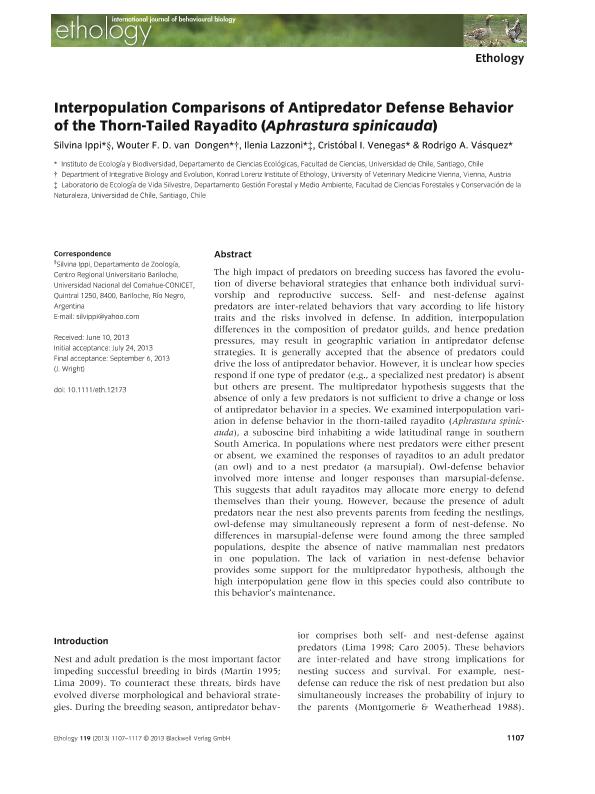Mostrar el registro sencillo del ítem
dc.contributor.author
Ippi, Silvina Graciela

dc.contributor.author
van Dongen, Wouter F. D.
dc.contributor.author
Lazzoni, Ilenia
dc.contributor.author
Venegas, Cristobal I.
dc.contributor.author
Vásquez, Rodrigo A.
dc.date.available
2017-06-06T21:04:33Z
dc.date.issued
2013-12
dc.identifier.citation
Ippi, Silvina Graciela; van Dongen, Wouter F. D.; Lazzoni, Ilenia; Venegas, Cristobal I.; Vásquez, Rodrigo A.; Interpopulation Comparisons of Antipredator Defense Behavior of the Thorn-Tailed Rayadito (Aphrastura spinicauda); Wiley; Ethology; 119; 2; 12-2013; 1107-1117
dc.identifier.issn
0179-1613
dc.identifier.uri
http://hdl.handle.net/11336/17636
dc.description.abstract
The high impact of predators on breeding success has favored the evolution of diverse behavioral strategies that enhance both individual survivorship and reproductive success. Self- and nest-defense against predators are inter-related behaviors that vary according to life history traits and the risks involved in defense. In addition, interpopulation differences in the composition of predator guilds, and hence predation pressures, may result in geographic variation in antipredator defense strategies. It is generally accepted that the absence of predators could drive the loss of antipredator behavior. However, it is unclear how species respond if one type of predator (e.g., a specialized nest predator) is absent but others are present. The multipredator hypothesis suggests that the absence of only a few predators is not sufficient to drive a change or loss of antipredator behavior in a species. We examined interpopulation variation in defense behavior in the thorn-tailed rayadito (Aphrastura spinicauda), a suboscine bird inhabiting a wide latitudinal range in southern South America. In populations where nest predators were either present or absent, we examined the responses of rayaditos to an adult predator (an owl) and to a nest predator (a marsupial). Owl-defense behavior involved more intense and longer responses than marsupial-defense. This suggests that adult rayaditos may allocate more energy to defend themselves than their young. However, because the presence of adult predators near the nest also prevents parents from feeding the nestlings, owl-defense may simultaneously represent a form of nest-defense. No differences in marsupial-defense were found among the three sampled populations, despite the absence of native mammalian nest predators in one population. The lack of variation in nest-defense behavior provides some support for the multipredator hypothesis, although the high interpopulation gene flow in this species could also contribute to this behavior’s maintenance.
dc.format
application/pdf
dc.language.iso
eng
dc.publisher
Wiley

dc.rights
info:eu-repo/semantics/openAccess
dc.rights.uri
https://creativecommons.org/licenses/by-nc-sa/2.5/ar/
dc.subject
Antipredator Behavior
dc.subject
Geographic Variation
dc.subject
Multi-Predator Hypothesis
dc.subject
Mobbing Behavior
dc.subject.classification
Zoología, Ornitología, Entomología, Etología

dc.subject.classification
Ciencias Biológicas

dc.subject.classification
CIENCIAS NATURALES Y EXACTAS

dc.title
Interpopulation Comparisons of Antipredator Defense Behavior of the Thorn-Tailed Rayadito (Aphrastura spinicauda)
dc.type
info:eu-repo/semantics/article
dc.type
info:ar-repo/semantics/artículo
dc.type
info:eu-repo/semantics/publishedVersion
dc.date.updated
2015-10-15T20:00:26Z
dc.journal.volume
119
dc.journal.number
2
dc.journal.pagination
1107-1117
dc.journal.pais
Estados Unidos

dc.journal.ciudad
Hoboken
dc.description.fil
Fil: Ippi, Silvina Graciela. Universidad de Chile; Chile. Consejo Nacional de Investigaciones Científicas y Técnicas; Argentina
dc.description.fil
Fil: van Dongen, Wouter F. D.. Universidad de Chile; Chile. University of Veterinary Medicine Vienna; Austria
dc.description.fil
Fil: Lazzoni, Ilenia. Universidad de Chile; Chile
dc.description.fil
Fil: Venegas, Cristobal I.. Universidad de Chile; Chile
dc.description.fil
Fil: Vásquez, Rodrigo A.. Universidad de Chile; Chile
dc.journal.title
Ethology

dc.relation.alternativeid
info:eu-repo/semantics/altIdentifier/url/http://onlinelibrary.wiley.com/doi/10.1111/eth.12173/abstract
dc.relation.alternativeid
info:eu-repo/semantics/altIdentifier/doi/http://dx.doi.org/10.1111/eth.12173
Archivos asociados
